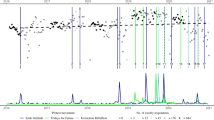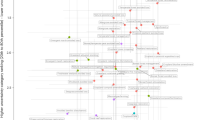Abstract
A sizeable (and growing) proportion of the public in Western democracies deny the existence of anthropogenic climate change1,2. It is commonly assumed that convincing deniers that climate change is real is necessary for them to act pro-environmentally3,4. However, the likelihood of ‘conversion’ using scientific evidence is limited because these attitudes increasingly reflect ideological positions5,6. An alternative approach is to identify outcomes of mitigation efforts that deniers find important. People have strong interests in the welfare of their society, so deniers may act in ways supporting mitigation efforts where they believe these efforts will have positive societal effects. In Study 1, climate change deniers (N=155) intended to act more pro-environmentally where they thought climate change action would create a society where people are more considerate and caring, and where there is greater economic/technological development. Study 2 (N=347) replicated this experimentally, showing that framing climate change action as increasing consideration for others, or improving economic/technological development, led to greater pro-environmental action intentions than a frame emphasizing avoiding the risks of climate change. To motivate deniers’ pro-environmental actions, communication should focus on how mitigation efforts can promote a better society, rather than focusing on the reality of climate change and averting its risks.
This is a preview of subscription content, access via your institution
Access options
Subscribe to this journal
Receive 12 print issues and online access
$209.00 per year
only $17.42 per issue
Buy this article
- Purchase on Springer Link
- Instant access to full article PDF
Prices may be subject to local taxes which are calculated during checkout

Similar content being viewed by others
Change history
04 July 2012
This Letter has an addendum associated with it, please see the pdf for full details.
References
Leiserowitz, A., Maibach, E., Roser-Renouf, C. & Smith, N. Global Warming’s Six Americas (Yale Project on Climate Change Communication, 2011).
Leviston, Z., Leitch, A., Greenhill, M., Leonard, R. & Walker, I. Australians’ Views of Climate Change (Commonwealth Scientific and Industrial Research Organisation, 2011).
Washington, H. & Cook, J. Climate Change Denial: Heads in the Sand (Earthscan, 2011).
Pidgeon, N. & Fischhoff, B. The role of social and decision sciencesin communicating uncertain climate risks. Nature Clim. Change 1, 35–41 (2011).
Hoffman, A. J. The growing climate divide. Nature Clim. Change 1, 195–196 (2011).
McCright, A. M. & Dunlap, R. E. The politicization of climate change and polarization in the American public’s views of global warming, 2001–2010. Soc. Quart. 52, 155–194 (2011).
Tranter, B. Political divisions over climate change and environmental issues in Australia. Environ. Politics 20, 78–96 (2011).
McCright, A. M. & Dunlap, R. E. Defeating Kyoto: The Conservative movement’s impact on U.S. climate change policy. Soc. Prob. 50, 348–373 (2003).
Oreskes, N. & Conway, E. M. Merchants of Doubt: How a Handful of Scientists Obscured the Truth on Issues from Tobacco Smoke to Global Warming (Bloomsbury Press, 2010).
Jacques, P. J., Dunlap, R. E. & Freeman, M. The organisation of denial: Conservative think tanks and environmental scepticism. Environ. Politics 17, 349–385 (2008).
Moser, S. C. & Dilling, L. in Creating a Climate for Change: Communicating Climate Change and Facilitating Social Change (eds Moser, S. C. & Dilling, L.) Ch. 32, 491–516 (Cambridge Univ. Press, 2007).
Hoffman, A. J. Talking past each other? Cultural framing of skeptical and convinced logics in the climate change debate. Org. Environ. 24, 3–33 (2011).
Kahan, D. M., Jenkins-Smith, H. & Braman, D. Cultural cognition of scientific consensus. J. Risk Res. 14, 147–174 (2011).
Kunda, Z. The case for motivated reasoning. Psychol. Bull. 108, 480–498 (1990).
Whole-system science, Nature Clim. Change 1, 1 (2011).
Hulme, M. Meet the humanities. Nature Clim. Change 1, 177–179 (2011).
Stern, P. C. Toward a coherent theory of environmentally significant behavior. J. Soc. Issues 56, 407–424 (2000).
Stern, P. C. Contributions of psychology to limiting climate change. Am. Psychol. 66, 303–314 (2011).
Lorenzoni, I., Nicholson-Cole, S. & Whitmarsh, L. Barriers perceived to engaging with climate change among the UK public and their policy implications. Glob. Environ. Change 17, 445–459 (2007).
Ockwell, D., Whitmarsh, L. & O’Neill, S. Reorienting climate change communication for effective mitigation: Forcing people to be green or fostering grass-roots engagement? Sci. Commun. 30, 305–327 (2009).
Sathaye, J. et al. in IPCC Climate Change 2007: Mitigation (eds Metz, B. et al.) 692–743 (Cambridge Univ. Press, 2007).
Fiske, S. T., Cuddy, A. J. C., Glick, P. & Xu, J. A model of (often mixed) stereotype content: Competence and warmth respectively follow from perceived status and competition. J. Personal. Soc. Psychol. 82, 878–902 (2002).
Judd, C. M., James-Hawkins, L., Yzerbyt, V. & Kashima, Y. Fundamental dimensions of social judgment: Understanding the relations between judgments of competence and warmth. J. Personal. Soc. Psychol. 89, 899–913 (2005).
Leach, C. W., Ellemers, N. & Barreto, M. Group virtue: The importance of morality (vs. competence and sociability) in the positive evaluation of in-groups. J. Personal. Soc. Psychol. 93, 234–249 (2007).
Hennessy, K. et al. in IPCC Climate Change 2007: Impacts, Adaptation and Vulnerability (eds Parry, M. L. et al.) Ch. 11, 507–540 (Cambridge Univ.Press, 2007).
Chong, D. & Druckman, J. N. Framing theory. Ann. Rev. Politi. Sci. 10, 103–126 (2007).
Weber, E. U. & Stern, P. C. Public understanding of climate change in the United States. Am. Psychol. 66, 315–328 (2011).
McCright, A. M. & Dunlap, R. E. Anti-reflexivity: The American conservative movement’s success in undermining climate science and policy. Theor. Culture Soc. 27, 100–133 (2010).
Spence, A., Poortinga, W., Butler, C. & Pidgeon, N. F. Perceptions of climate change and willingness to save energy related to flood experience. Nature Clim. Change 1, 46–49 (2011).
Kashima, Y. et al. Folk theory of social change. Asian J. Soc. Psychol. 12, 227–246 (2009).
Acknowledgements
This research was supported by an Australian Research Council Discovery Project Grant (DP0984678) to the first author. The authors thank A. Mackintosh, M. Manning, O. Hoegh-Guldberg, J. Lawrence and A. Ryan for their comments on manuscript drafts.
Author information
Authors and Affiliations
Contributions
P.G.B. designed the studies, coordinated data collection, analysed the data and wrote the paper. M.J.H. contributed to the design and analysis of both studies and writing the paper. R.B. contributed to the design and analysis of Study 2 and writing the paper. C.J. contributed to the analysis of Study 1 and writing the paper.
Corresponding author
Ethics declarations
Competing interests
The authors declare no competing financial interests.
Supplementary information
Rights and permissions
About this article
Cite this article
Bain, P., Hornsey, M., Bongiorno, R. et al. Promoting pro-environmental action in climate change deniers. Nature Clim Change 2, 600–603 (2012). https://doi.org/10.1038/nclimate1532
Received:
Accepted:
Published:
Issue Date:
DOI: https://doi.org/10.1038/nclimate1532
This article is cited by
-
Climate Change Denial and Corporate Environmental Responsibility
Journal of Business Ethics (2024)
-
Making people aware of eco-innovations can decrease climate despair
Climatic Change (2023)
-
The durable, bipartisan effects of emphasizing the cost savings of renewable energy
Nature Energy (2022)
-
Positive, global, and health or environment framing bolsters public support for climate policies
Communications Earth & Environment (2022)
-
A toolkit for understanding and addressing climate scepticism
Nature Human Behaviour (2022)



